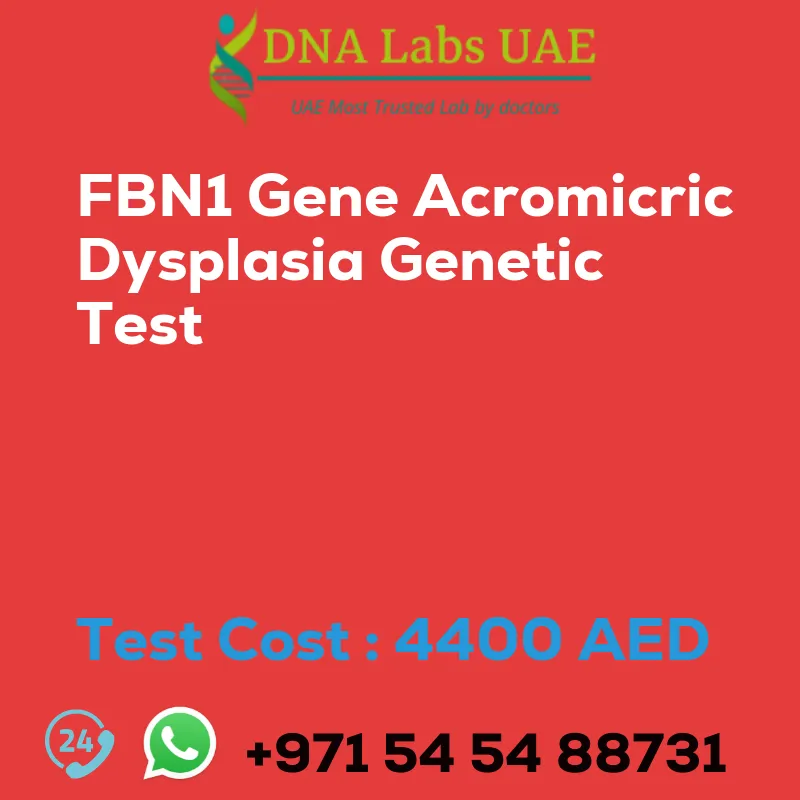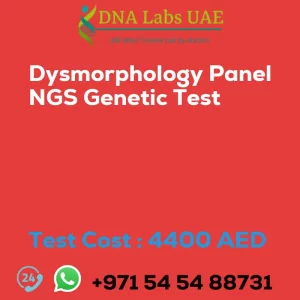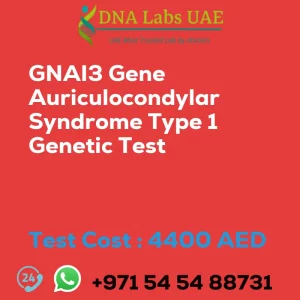FBN1 Gene Acromicric Dysplasia Genetic Test
Cost: AED 4400.0
Symptoms and Diagnosis
Acromicric dysplasia is a rare genetic disorder characterized by short stature, shortening and thickening of the long bones, joint limitations, and distinctive facial features such as a round face, a small chin, and a flat nasal bridge. To diagnose acromicric dysplasia, a genetic test called the FBN1 Gene Acromicric Dysplasia Genetic Test can be performed.
Test Details
The FBN1 gene is associated with acromicric dysplasia. The FBN1 Gene Acromicric Dysplasia Genetic Test uses NGS (Next-Generation Sequencing) technology to analyze the entire coding region of the FBN1 gene. This comprehensive approach allows for a more accurate and efficient diagnosis compared to traditional sequencing methods.
Test Components
- Price: AED 4400.0
- Sample Condition: Blood or Extracted DNA or One drop Blood on FTA Card
- Report Delivery: 3 to 4 Weeks
- Method: NGS Technology
- Test Type: Dysmorphology
- Doctor: Pediatrics
- Test Department: Genetics
Pre Test Information
Prior to undergoing the FBN1 Gene Acromicric Dysplasia Genetic Test, it is important to provide the clinical history of the patient. Additionally, a genetic counseling session may be conducted to draw a pedigree chart of family members affected with FBN1 Gene Acromicric Dysplasia.
How the Test Works
The FBN1 Gene Acromicric Dysplasia Genetic Test can be performed using a blood or saliva sample. The sample is sent to a specialized laboratory where the DNA is extracted and sequenced using NGS technology. The resulting genetic data is then analyzed and compared to a reference sequence to identify any disease-causing mutations in the FBN1 gene.
Benefits of the Test
The information obtained from the FBN1 Gene Acromicric Dysplasia Genetic Test can be used for diagnostic purposes, genetic counseling, and family planning. It can also help healthcare providers determine the best treatment and management strategies for individuals with acromicric dysplasia.
| Test Name | FBN1 Gene Acromicric dysplasia Genetic Test |
|---|---|
| Components | |
| Price | 4400.0 AED |
| Sample Condition | Blood or Extracted DNA or One drop Blood on FTA Card |
| Report Delivery | 3 to 4 Weeks |
| Method | NGS Technology |
| Test type | Dysmorphology |
| Doctor | Pediatrics |
| Test Department: | Genetics |
| Pre Test Information | Clinical History of Patient who is going for FBN1 Gene Acromicric dysplasia NGS Genetic DNA Test. A Genetic Counselling session to draw a pedigree chart of family members affected with FBN1 Gene Acromicric dysplasia NGS Genetic DNA Test gene FBN1 |
| Test Details |
The FBN1 gene is associated with a genetic disorder called acromicric dysplasia. Acromicric dysplasia is a rare genetic disorder characterized by short stature, shortening and thickening of the long bones, joint limitations, and distinctive facial features such as a round face, a small chin, and a flat nasal bridge. NGS (Next-Generation Sequencing) genetic testing is a type of genetic test that uses advanced sequencing technologies to analyze multiple genes simultaneously. In the case of acromicric dysplasia, NGS genetic testing can be used to identify mutations or changes in the FBN1 gene that may be causing the disorder. By analyzing the entire coding region of the FBN1 gene, NGS can detect a wide range of genetic variants, including small point mutations, insertions, deletions, and larger structural changes. This comprehensive approach allows for a more accurate and efficient diagnosis of acromicric dysplasia compared to traditional sequencing methods. NGS genetic testing for acromicric dysplasia can be performed using a blood or saliva sample. The sample is sent to a specialized laboratory where the DNA is extracted and sequenced. The resulting genetic data is then analyzed and compared to a reference sequence to identify any disease-causing mutations in the FBN1 gene. The information obtained from NGS genetic testing can be used for diagnostic purposes, genetic counseling, and family planning. It can also help healthcare providers determine the best treatment and management strategies for individuals with acromicric dysplasia. |







